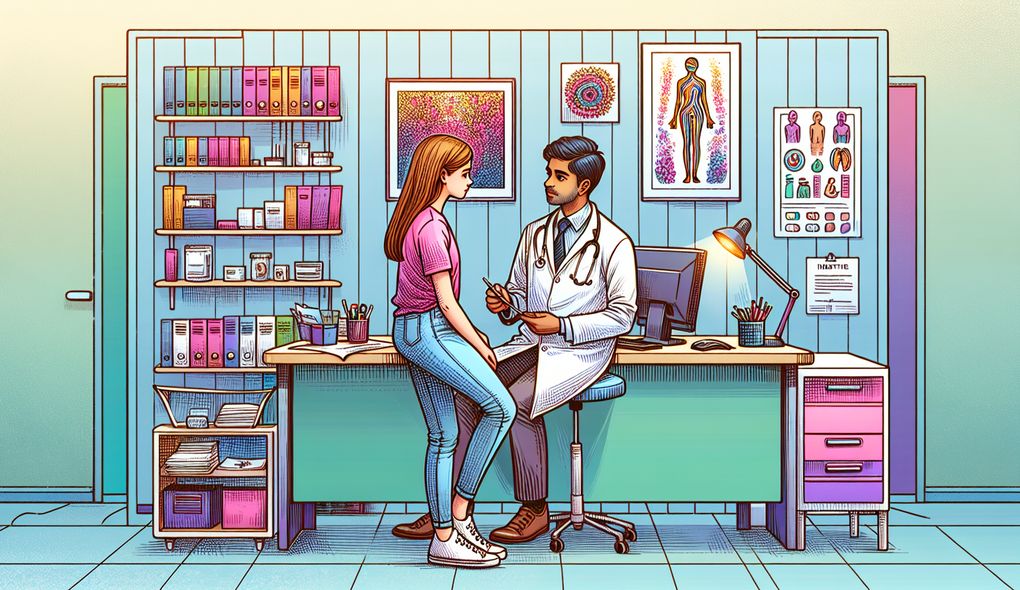Can you share a challenging case you've managed involving a substance use disorder or mental health condition in an adolescent?
JUNIOR LEVEL

Sample answer to the question:
Yes, I can share a challenging case I've managed involving a substance use disorder in an adolescent. I had a patient, a 16-year-old girl, who was struggling with a severe addiction to alcohol. She had been drinking heavily for over a year, and it was impacting her school performance, relationships, and overall well-being. As her primary care provider, I worked closely with her and her family to develop a comprehensive treatment plan. This included individual therapy, family therapy, and participation in a support group for teens dealing with substance abuse. We also connected her with a specialized substance abuse counselor who helped address the underlying issues contributing to her addiction. Over several months, we closely monitored her progress, adjusting the treatment plan as needed. With time and support, she was able to overcome her addiction and rebuild her life. It was a challenging case, but seeing her transformation was incredibly rewarding.
Here is a more solid answer:
One challenging case I managed involved a 15-year-old boy who struggled with both a substance use disorder and a co-occurring mental health condition. He had been experimenting with drugs and was experiencing severe anxiety and depression. As an Adolescent Medicine Specialist, I took a comprehensive approach to his care. I worked closely with a team of mental health professionals to address his mental health symptoms through therapy and medication management. Simultaneously, we focused on his substance use disorder by connecting him with a substance abuse counselor and involving his family in therapy sessions. Additionally, I emphasized regular check-ins to monitor his progress and provided education to him and his family about the risks associated with substance use. Over time, we were able to help him develop healthier coping mechanisms, manage his mental health symptoms, and achieve sobriety. This case showcased my strong clinical skills, effective communication with the teenager and his family, ability to work as part of a multidisciplinary team, and knowledge of legal and ethical issues related to adolescent healthcare.
Why is this a more solid answer?
The solid answer provides more specific details and depth in addressing the evaluation areas and the job description. It mentions a case involving both a substance use disorder and a co-occurring mental health condition, highlighting the candidate's ability to address complex cases. It also emphasizes the comprehensive approach taken, collaboration with a multidisciplinary team, and adherence to legal and ethical considerations. However, the answer can still be improved by providing more specific examples of effective communication and cultural competency.
An example of a exceptional answer:
I had the opportunity to manage a challenging case involving a 17-year-old transgender individual who was struggling with substance use disorder and co-occurring mental health issues, including depression and trauma-related symptoms. The individual faced significant barriers accessing appropriate healthcare due to systemic discrimination and lack of understanding. As an Adolescent Medicine Specialist, I advocated for their rights and provided comprehensive care in a culturally competent manner. I collaborated with a team of professionals from diverse backgrounds, including a mental health provider with expertise in LGBTQ+ health, to address their unique needs. We employed evidence-based interventions, such as cognitive-behavioral therapy and medication management, while creating a safe and affirming space for the individual to discuss their experiences. In addition to individual therapy sessions, we facilitated support groups specifically tailored to transgender adolescents facing substance use disorders. Throughout the treatment process, I maintained open and honest communication with the individual and their family, ensuring they were active participants in decision-making. This case exemplified my strong clinical skills, cultural competency, empathy towards the unique perspectives of adolescents, and commitment to providing ethical and inclusive care.
Why is this an exceptional answer?
The exceptional answer provides a detailed and comprehensive description of a challenging case involving an adolescent with substance use disorder and co-occurring mental health issues, specifically focusing on the unique experiences of a transgender individual. It demonstrates the candidate's ability to navigate complex and sensitive situations and showcases strong clinical skills, cultural competency, empathy, and understanding. The answer also highlights the candidate's commitment to advocacy and inclusive care. Additionally, it mentions evidence-based interventions, collaboration with a diverse multidisciplinary team, and effective communication with the individual and their family. Overall, the exceptional answer goes above and beyond in addressing the evaluation areas and the job description by providing specific and impactful details.
How to prepare for this question:
- Familiarize yourself with evidence-based interventions and treatment approaches for substance use disorders and mental health conditions in adolescents.
- Stay updated with the latest research and guidelines in adolescent medicine, particularly in the field of substance use disorders and mental health.
- Develop effective communication skills to engage with teenagers and their families. Practice active listening and empathy.
- Enhance your cultural competency by learning about various cultural perspectives and LGBTQ+ health issues.
- Stay informed about legal and ethical considerations in adolescent healthcare, including confidentiality and consent.
- Consider participating in workshops, conferences, or seminars related to adolescent health and substance abuse to expand your knowledge and skills.
What are interviewers evaluating with this question?
- Strong clinical skills with an emphasis on adolescent health
- Effective communication skills for working with teenagers and their families
- Cultural competency to engage with a diverse patient population
- Ability to work as part of a multidisciplinary team
- Capacity for empathy and understanding the unique perspectives of adolescents
- Knowledge of legal and ethical issues related to adolescent healthcare

